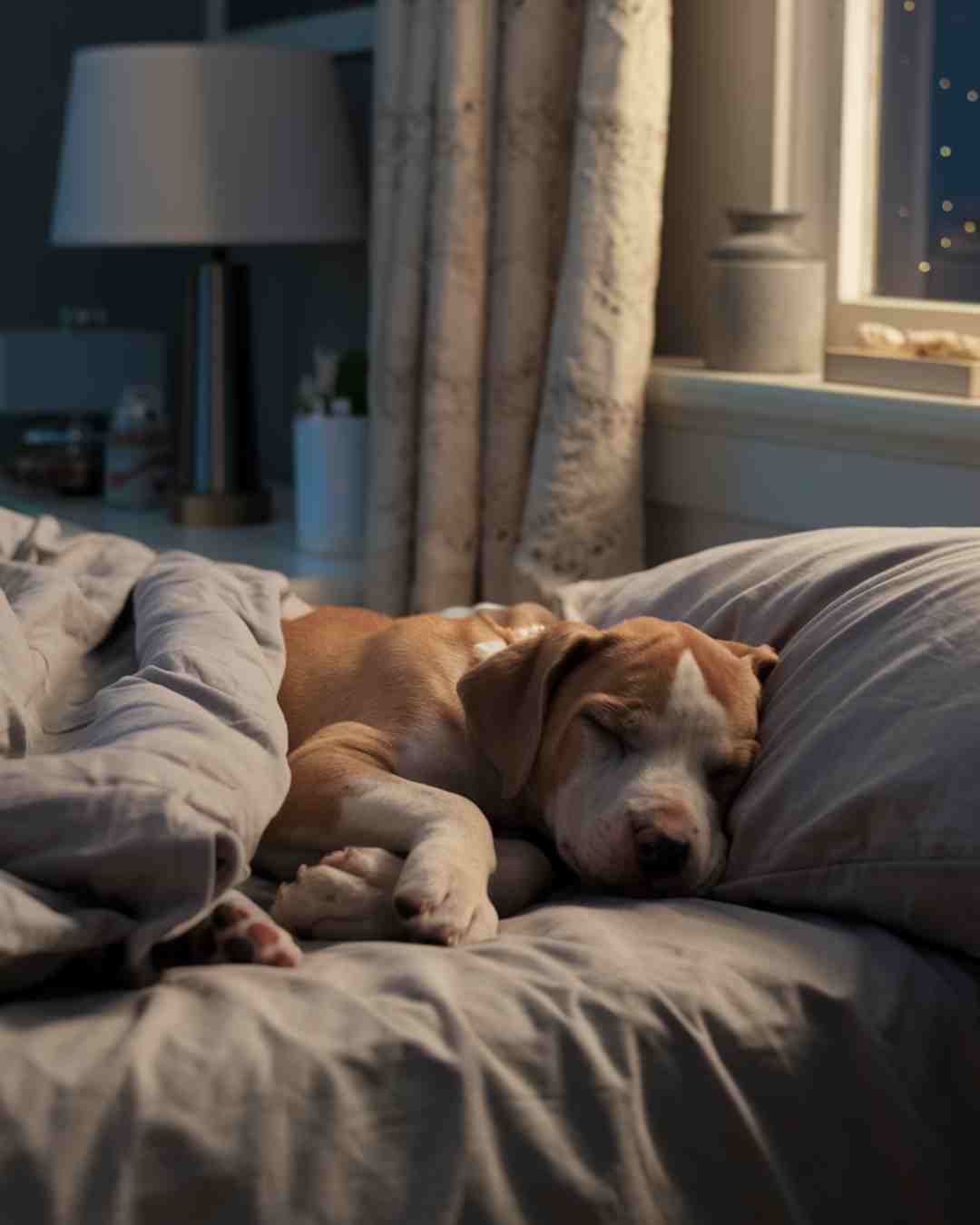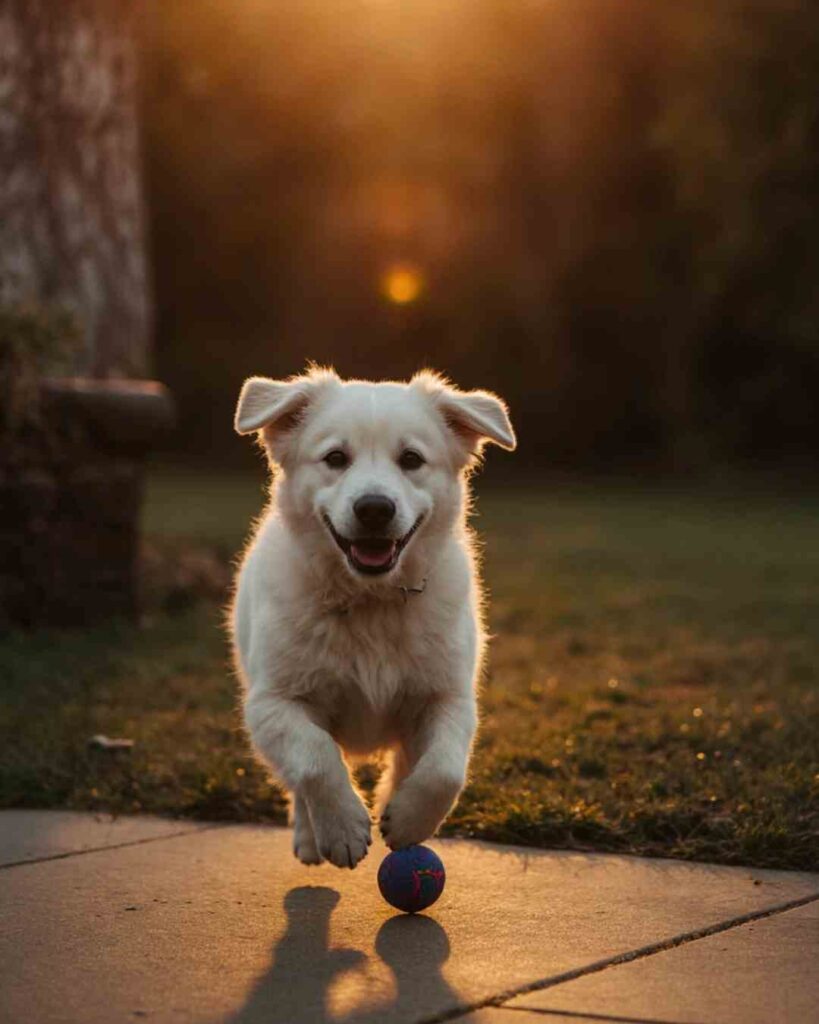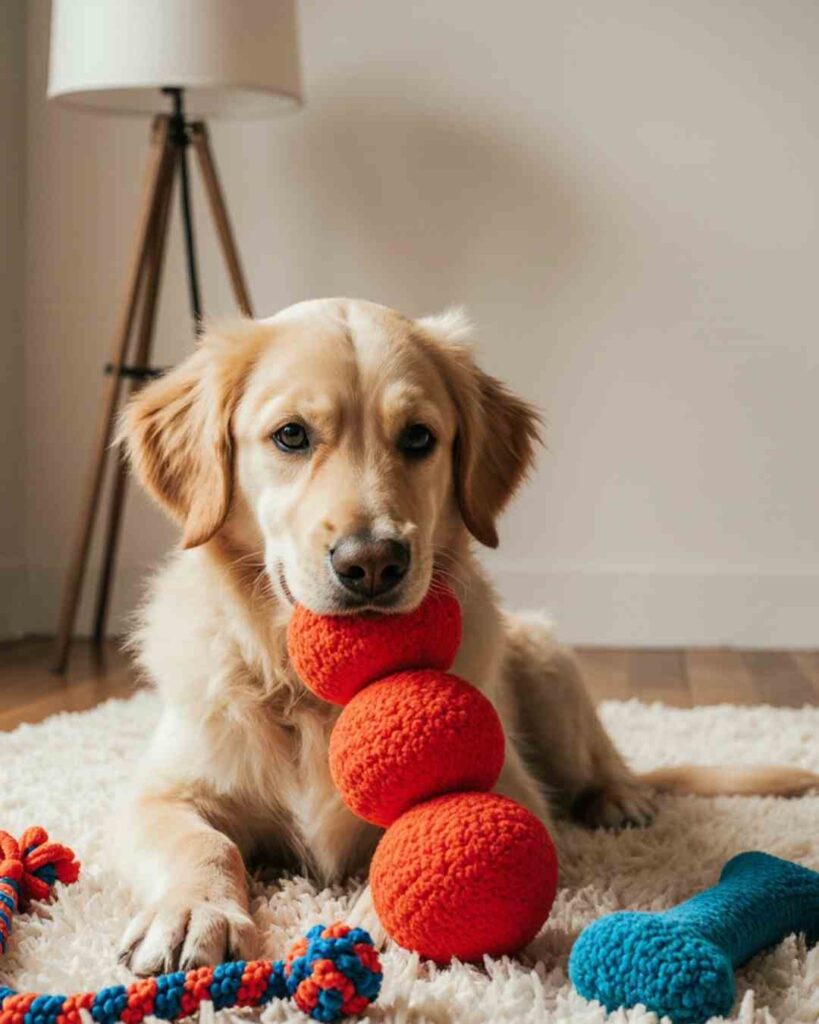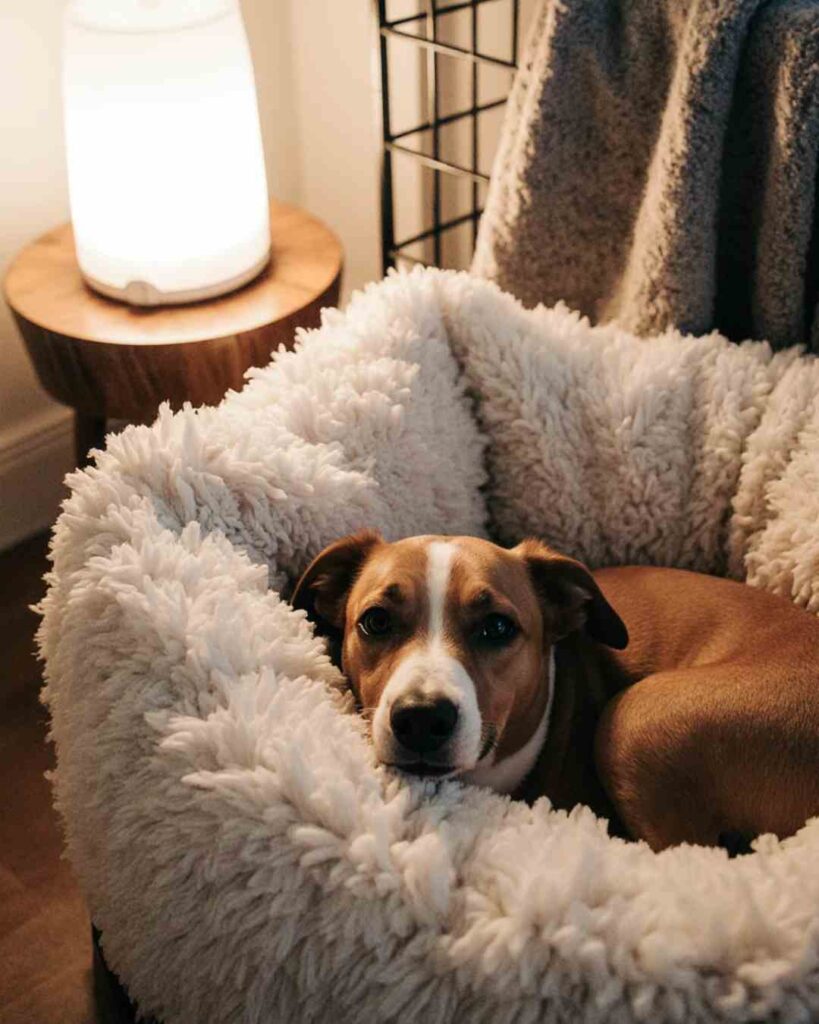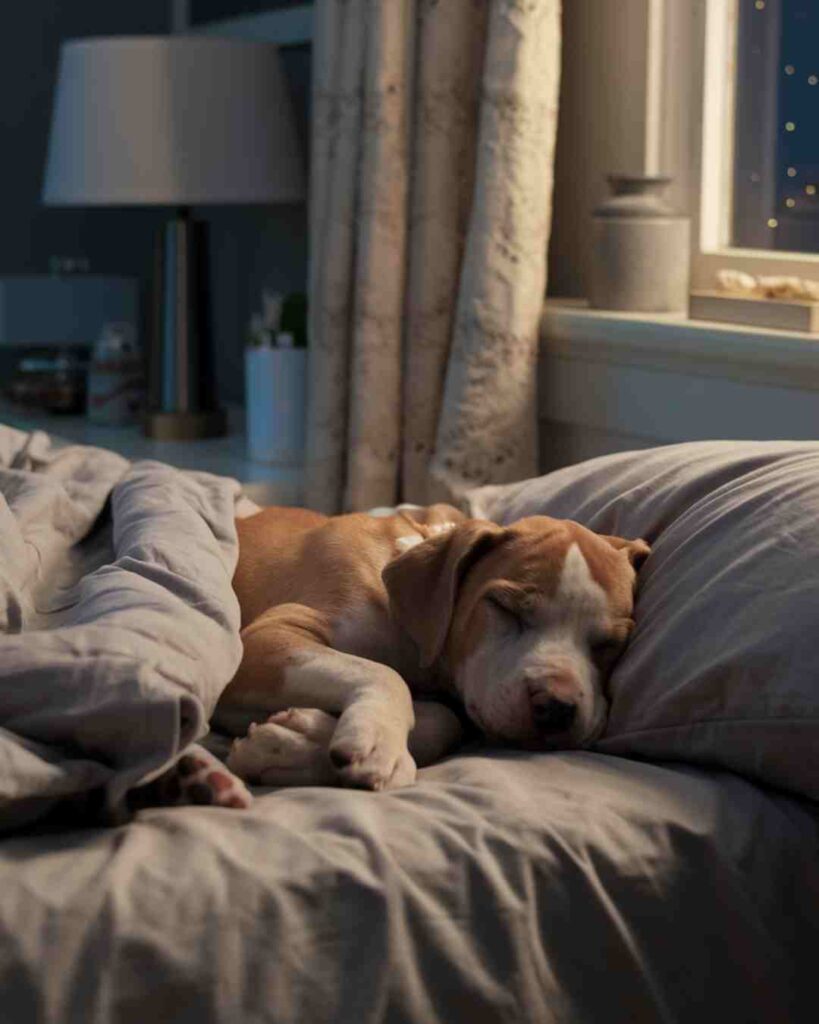5 Proven Methods to Stop Your Puppy Biting at Night (And Finally Sleep Peacefully)
Want to stop puppy biting at night? You’re not alone — every new dog parent knows that midnight nibbling can turn bedtime into chaos. I’ve been there too, staring at the ceiling while my tiny furball chewed my fingers like a snack. But don’t worry — these 5 proven methods will help you calm your pup, train better, and finally sleep peacefully.
Why Puppies Bite (Especially at Night)
Okay, before we fix the problem, it helps to understand why it’s happening. Puppies bite for a few reasons — and it’s not because they’re evil masterminds plotting your insomnia.
- Teething: Just like human babies, puppies go through teething. Those sore gums make them want to chew everything.
- Overstimulation: Too much play before bed can wind them up. Imagine trying to sleep right after an amusement park ride.
- Attention-seeking: Some pups learn that biting gets a reaction — even a “No!” or “Ouch!” counts as attention.
- Anxiety or fear: If your puppy feels lonely or anxious when you turn off the lights, they might start biting to cope.
Ever notice how biting gets worse on nights you’re busier or forget their playtime routine? That’s not a coincidence.
Now that we know the “why,” let’s fix the “how.”
1. Tire Them Out Before Bed
This one’s my absolute go-to. Puppies are little energy bombs. If they don’t burn it off during the day, guess when they’ll release it? Right when you’re trying to sleep.
So, the key is to set up a calm-down routine before bedtime.
Here’s what works like a charm:
- 30 minutes of gentle play about an hour before bed — fetch, tug-of-war, or short walks.
- End the night calmly, not in hyper mode. Slow belly rubs, soft talking, or chew time with a quiet toy works wonders.
- Avoid rough play right before bed — that amps them up.
When I first trained my pup, I noticed that on nights we skipped his evening walk, he was twice as bitey. Once I made bedtime exercise non-negotiable, the biting dropped fast.
Pro tip: A tired puppy = a sleepy puppy.
2. Provide Safe Chew Alternatives
When your puppy starts mouthing your hands, redirect the urge to something safe. Keep various toys around. For a comprehensive list of toxic household items and foods to avoid, please reference the ASPCA Poison Control Center’s Guide before providing any edible chews or novel toys.
Try this simple trick:
When your puppy starts mouthing your hands or clothes, say “no” calmly and hand them a chew toy instead.
Keep a few types around:
- Rubber teething toys (like KONGs) — you can even freeze them for sore gums.
- Soft plush toys — good for cuddly pups.
- Edible chews (supervised only!) — like bully sticks or dental chews.
Rotate them nightly so your pup doesn’t get bored.
And here’s a secret: freezing wet washcloths can soothe teething pain and stop biting fast. Just dip one in water, freeze it, and hand it over. Worked like magic for my pup when he was 12 weeks old.
3. Set Up a Comfortable Sleep Environment
Sometimes biting isn’t about energy or teething — it’s about comfort. Imagine being left alone in the dark after spending all day with your favorite human. Puppies don’t get it — they just feel abandoned.
That anxiety can turn into restless biting or whining.
Here’s how to make bedtime less scary:
- Use a crate or playpen, but make it cozy. Add a soft blanket, a small plush toy, and something that smells like you.
- Try a heartbeat toy or white noise machine — these mimic the feeling of being near their littermates.
- Keep the crate nearby for the first few weeks. Hearing you breathe helps them relax.
I kept my pup’s crate beside my bed for a month, and the change was huge. He went from chewing his bed to snoozing peacefully within days.
Remember: a calm pup doesn’t bite.
4. Train Bite Inhibition (the Smart Way)
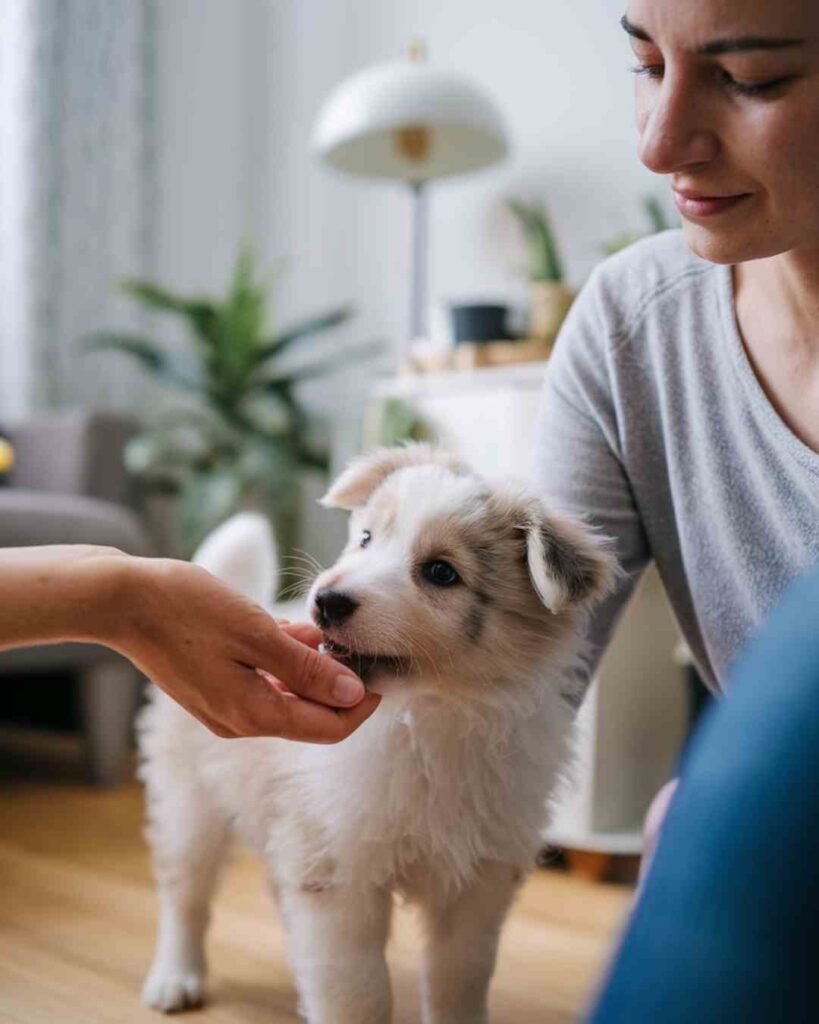
Bite inhibition is just a fancy term for teaching your puppy how hard is too hard. This is one of the most effective long-term solutions to stop biting — not just at night but all the time.
Here’s the simple 3-step trick I swear by:
- When your puppy bites, let out a short “Ouch!”
Make it sharp enough to startle them but not scare them. - Stop all play immediately.
Puppies learn fast that biting = no fun. - Wait a few seconds, then go back to calm play or give a toy.
This mimics what littermates do — when one bites too hard, the other yelps and walks away.
Consistency is key. Everyone in your house needs to react the same way. Otherwise, your puppy gets mixed signals and the biting continues.
Ever noticed how your pup behaves differently with each person? That’s why consistent reactions matter more than anything.
5. Maintain a Calm Nighttime Routine
This one’s overlooked but super powerful. Puppies thrive on routine. When they know what to expect, their anxiety drops, and so does their nighttime biting.
Here’s what a good bedtime routine looks like:
- Last potty break about 15–20 minutes before bed.
- Gentle play or quiet cuddle time (no roughhousing).
- Chew toy time in their crate to relax the jaw and mind.
- Lights off, calm tone, same bedtime every night.
Stick to this for a week, and you’ll see major improvement. Puppies are creatures of habit. Once they associate nighttime with quiet, predictable events, their biting usually fades out on its own.
And honestly — it helps you too. My puppy used to wake me up three times a night until I set this schedule. Now, he’s out cold by 10 p.m., and I finally get my beauty sleep back.
Bonus Tip: Don’t Reinforce Bad Behavior
Sometimes, without realizing it, we accidentally reward the biting.
Here’s how that happens:
You yelp → your puppy gets excited → they bite again because they think it’s a game.
Or you scold them loudly → they get attention → mission accomplished.
Instead, stay calm and quiet. Redirect or walk away. Silence teaches faster than shouting.
It’s tough at first (trust me, I’ve had those “why won’t you just stop?” nights), but staying chill makes a big difference.
Common Mistakes to Avoid
Let’s be real — everyone messes this up at first. But here are some mistakes you’ll want to skip if you don’t want to make things worse:
- Using punishment: Yelling or tapping their nose makes them scared, not obedient. Fear can lead to more biting.
- Inconsistent training: If one person allows play-biting and another doesn’t, your pup gets confused.
- Overlooking exercise: A tired pup is peaceful; an under-exercised pup becomes a land shark.
- Skipping crate training: Crates aren’t cruel — they’re comfort zones when introduced properly.
Consistency + patience = peaceful nights.
When to Worry (and Get Professional Help)
Most puppy biting is totally normal, but there are times you’ll want to consult a vet or trainer:
- If your puppy’s biting seems aggressive rather than playful.
- If the biting keeps escalating after several weeks of training.
- If they’re biting out of fear, trembling, or showing whites of their eyes.
These can indicate stress, anxiety, or even medical discomfort — all things best checked by professionals.
No shame in asking for help. I did, and it made training smoother for both of us.
Resources for a Peaceful, Bite-Free Night
This post is a great first step! For ongoing success, use these related resources:
- 10 Must-Know Dog Training Tips for Beginners! (Easy Guide): (Master foundational commands and learn to achieve instant obedience, making all training easier.)
- Keep Your Dog Entertained While at Work: 6 Fun & Easy Ways to Make Them Happy: (Ideas for enrichment toys to tire your pup out during the day, reducing nighttime hyperactivity and biting.)
- Recipes: (Find homemade, high-value treat recipes perfect for stuffing KONGs to make the crate a positive, long-lasting chew zone at bedtime.)
Final Thoughts: Sleep Tight, Bite-Free Nights Ahead
Raising a puppy is like raising a toddler — adorable, chaotic, and sometimes sleepless. But with patience, structure, and a little understanding, you can totally train your puppy to stop biting at night.
Let’s recap your game plan:
- Burn that energy before bed.
- Redirect chewing to safe toys.
- Make bedtime cozy and comforting.
- Teach bite inhibition consistently.
- Stick to a calm routine.
Follow these five methods, and you’ll be sleeping peacefully in no time — no more midnight nibbles, no more shredded blankets.
Because honestly, you deserve to enjoy your puppy without the bite marks.
Now go grab those chew toys, set the mood lights, and get ready for the quietest night you’ve had all week.
